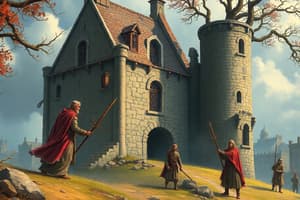Podcast
Questions and Answers
During which period did the epic Beowulf originate?
During which period did the epic Beowulf originate?
- Middle English period
- Anglo-Saxon period (correct)
- Renaissance
- 18th century
Which literary period introduced a new focus on humanism and led to the flourishing of drama and poetry?
Which literary period introduced a new focus on humanism and led to the flourishing of drama and poetry?
- 18th century
- Renaissance (correct)
- Anglo-Saxon period
- Middle English period
Who is considered the author of Robinson Crusoe, one of the earliest examples of English prose fiction?
Who is considered the author of Robinson Crusoe, one of the earliest examples of English prose fiction?
- Samuel Richardson
- Henry Fielding
- Daniel Defoe (correct)
- William Shakespeare
What type of literature emerged during the Middle English period?
What type of literature emerged during the Middle English period?
Which century is widely recognized as the golden age of English literature?
Which century is widely recognized as the golden age of English literature?
What marked the Renaissance period in relation to literature?
What marked the Renaissance period in relation to literature?
Which literary period is known for poets like William Wordsworth and Samuel Taylor Coleridge?
Which literary period is known for poets like William Wordsworth and Samuel Taylor Coleridge?
Which writer is associated with the 20th-century modernist movement in English literature?
Which writer is associated with the 20th-century modernist movement in English literature?
Who is known for the gritty realism in their writing among the listed authors?
Who is known for the gritty realism in their writing among the listed authors?
Which author is associated with speculative fiction in the 21st century?
Which author is associated with speculative fiction in the 21st century?
Who is known for his epic sagas from Anglo-Saxon times?
Who is known for his epic sagas from Anglo-Saxon times?
Which playwright emerged in the modern period of English literature?
Which playwright emerged in the modern period of English literature?
Flashcards are hidden until you start studying
Study Notes
Unraveling the World of English: Exploring Literature
English, a global language steeped in history and tradition, has evolved into a rich tapestry of literature that captivates and enlightens readers throughout the world. As we delve into the realm of English literature, we'll trace its roots and unpack the stories that have shaped this remarkable cultural heritage.
The Origins of English Literature
English literature's roots extend back to the Anglo-Saxon period, which began with the arrival of Germanic tribes in the 5th century. The epic Beowulf, considered one of the oldest surviving Old English works, was created around 750 AD. Later, the Middle English period, from the 11th to the 15th centuries, saw the emergence of verse narratives called romances and the writing of religious texts. The Renaissance, which began in the late 15th century, introduced a new focus on humanism, resulting in the flourishing of drama and poetry, particularly the works of William Shakespeare.
The Classic Period (18th Century)
The 18th century is widely recognized as the golden age of English literature. This period saw the rise of the novel, most notably with the works of Daniel Defoe, Samuel Richardson, and Henry Fielding. Defoe's Robinson Crusoe and Richardson's Pamela are considered some of the earliest examples of English prose fiction. Meanwhile, the poetry of Alexander Pope and Jonathan Swift became widely celebrated, and the drama of William Congreve and George Farquhar reflected the cultural and societal changes of the time.
The Romantic Period (19th Century)
The Romantic period, spanning the late 18th century to the mid-19th century, marked a significant shift in English literature, with writers exploring new themes and pushing the boundaries of the literary world. Poets such as William Wordsworth, Samuel Taylor Coleridge, and Lord Byron became well-known for their experiments with verse forms and their exploration of romantic love, nature, and the imagination. Novelists like Jane Austen, Charlotte Perkins Gilman, and Charles Dickens continued to develop the genre, providing readers with insightful portrayals of society and human nature.
The Modern Period (20th Century)
The 20th century witnessed a rapid and revolutionary transformation in English literature, as writers challenged traditional literary forms and explored new themes. The works of James Joyce, Virginia Woolf, and T.S. Eliot, to name a few, reflected the social, cultural, and artistic changes of the time. Modern literature also saw the rise of new genres such as science fiction with the works of H.G. Wells and J.R.R. Tolkien, and the emergence of playwrights like William Shakespeare and Tennessee Williams.
The 21st Century
In the 21st century, English literature continues to evolve, with writers exploring new themes and pushing the boundaries of the literary world. From the gritty realism of Zadie Smith and the speculative fiction of China Miéville to the dystopian worlds of Margaret Atwood and the magical realism of Gabriel García Márquez, English literature remains as vibrant and diverse as ever.
As we journey through the rich tapestry of English literature, we are reminded that the stories we read are reflections of our shared human experience. From the epic sagas of Anglo-Saxon times to the novels of the 21st century, English literature offers an unparalleled opportunity to explore the world and its inhabitants in all their complexity and beauty.
Studying That Suits You
Use AI to generate personalized quizzes and flashcards to suit your learning preferences.




